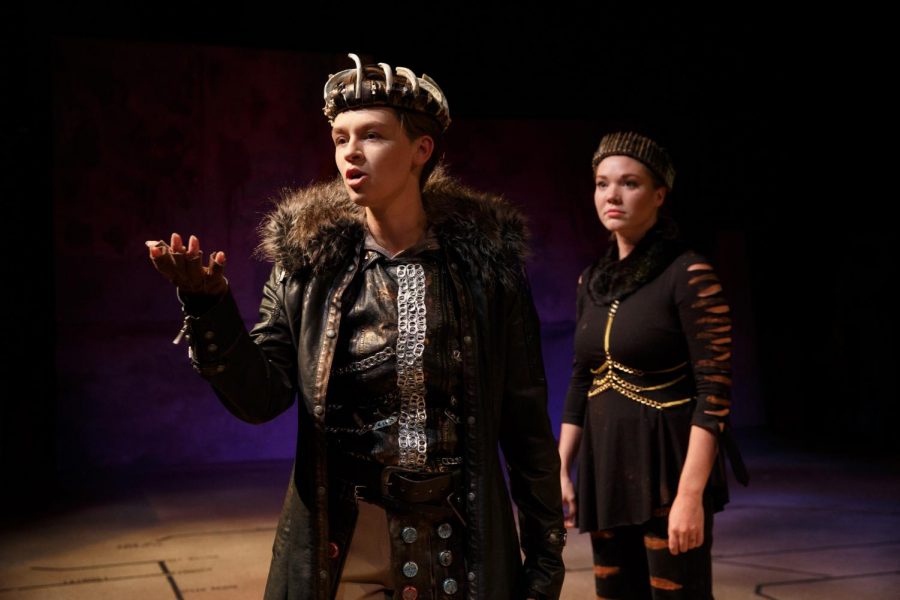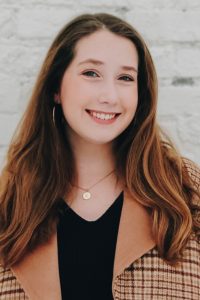U Theatre Reinvents ‘Macbeth’
September 28, 2019
While most people would not think of attending a Shakespearean play as a common activity for college students, the University of Utah’s Studio 115 was sold out as “Macbeth” opened on Friday, Sept. 27.
This rendition of the play is set in a future dystopian city, after a global apocalyptic collapse. For guest director Wendy Franz, the inspiration for the setting resulted from asking, “When there isn’t enough to go around, who decides who gets more and who gets less?” On a backdrop of an ambiguous, decrepit metro station, the single wall of this three-sided theater showed remnants of a polluted consumerist society in jarring graffiti that contained everything from anarchist symbols to “we owe God a death” and “reyes locos” (translation: crazy kings) to “alls well that ends well?”
Besides this shocking element to the stage, the remainder of the physical setting of the theater remained bare. Occasionally, a few props were added as the scenes dictated — and these props similarly reflected a post-apocalyptic world as most were reused or recycled items — but, the actors were the center of attention for this tight, visceral and explosive adaptation of “Macbeth.”
The students of the U’s Theatre Department starred in the play, and their dedication and intentionality in their acting was clearly evident. Not only did the pacing of the play focus on quickly progressing through the twists and turns of this tragedy, but the Shakespearean language felt accessible and simple to understand. Now, most students might not love Shakespeare as much as others, and probably fewer have taken a class on his works, but this adaptation brought Shakespearean language into the modern world — the dialogue felt natural and the audience members seemed to be tracking the plot effectively.
In the U’s take on “Macbeth,” both the titular character and Lady Macbeth are presented as female roles. Morgan Werder, who identifies as gender nonbinary, successfully takes on the female role of Macbeth as Selah McKenna brings Lady Macbeth to life. Werder and McKenna bring standout performances, and the energy that these two exude gives an exciting element to the play. Werder’s Macbeth is clearly initially torn by the prophecy of the witches, but her descent into madness and her ambition that transforms into corruption is a haunting yet enthralling process to watch. McKenna’s Lady Macbeth is similarly enchanting to see as her character relies on her ambition and creates sexual tension, yet this character also experiences a role reversal as she feels guilty for her actions — McKenna’s “out damned spot” scene is also one of my favorite scenes of the entire play. Along with the attention brought to the characters’ genders, the play addresses themes of toxic masculinity, female empowerment and relationships across traditionally strict gender binaries.
 In one of the final scenes of the play, Macbeth reflects that “life’s but a walking shadow.” While this quote has typically been interpreted as Macbeth’s attempts to state that life is an illusion — without much meaning — I found that this quote took on new meaning for me as I observed this adaptation. For Macbeth, life may not reflect much meaning, but for me, this quote eerily inspired me to reflect on how the play is unknowingly a shadow of our modern world. With recent political news breaking about our world leaders, their ambition may cloud their judgment and life may not seem to take on meaning. Yet, for supporters of the arts, we see light, emotion and hope in even the direst and darkest scenarios.
In one of the final scenes of the play, Macbeth reflects that “life’s but a walking shadow.” While this quote has typically been interpreted as Macbeth’s attempts to state that life is an illusion — without much meaning — I found that this quote took on new meaning for me as I observed this adaptation. For Macbeth, life may not reflect much meaning, but for me, this quote eerily inspired me to reflect on how the play is unknowingly a shadow of our modern world. With recent political news breaking about our world leaders, their ambition may cloud their judgment and life may not seem to take on meaning. Yet, for supporters of the arts, we see light, emotion and hope in even the direst and darkest scenarios.
While it might be taboo to say the word “Macbeth” in the theatre, I greatly enjoyed seeing this adaptation of the play. “Macbeth” will be running on Sept. 29, and on Oct. 3-6 in Studio 115 of the Performing Arts Building, 240 S., 1500 E. For University of Utah students, entry is free with your UCard, tickets for faculty and staff are $15 and General Admission tickets are $18.
With its violent scenes and harsh subject matter, this show is recommended for audience members 14 and up.












